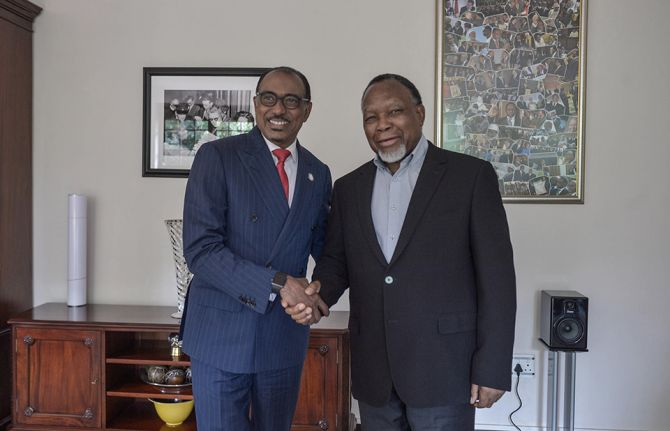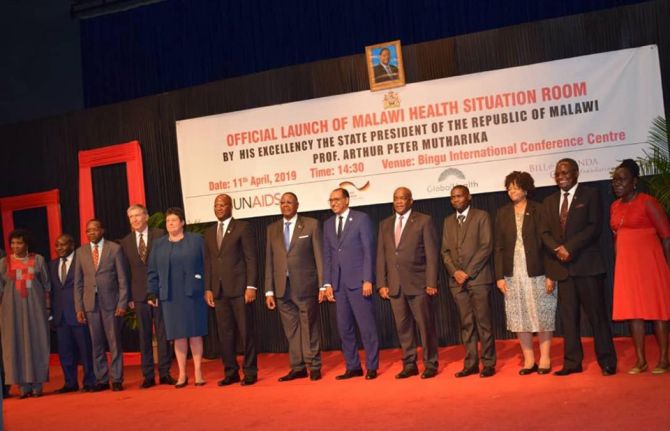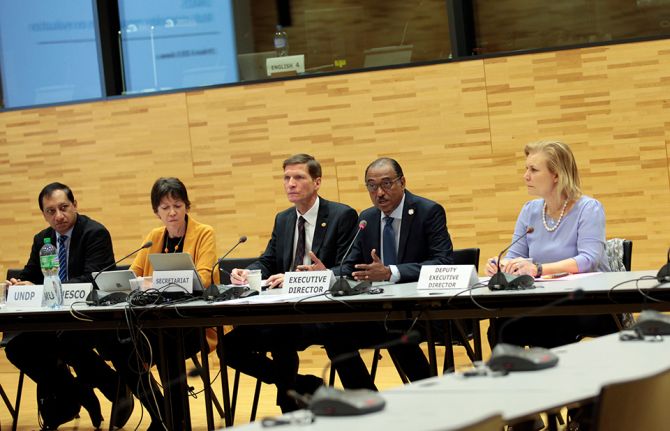
Feature Story
Faith leaders discuss ending stigma at prayer breakfast meeting
17 June 2011
17 June 2011 17 June 2011
Bishop Yvette Flunder addresses the inter-faith prayer breakfast held at Ford Foundation in New York City on 10 June.
Credit: Barry Mason/EAA
On the closing day of the United Nations General Assembly High Level Meeting on AIDS, faith-leaders came together with people living with HIV, representatives from key populations at higher risk of infection and other partners in the AIDS response to discuss ways to end stigma and to build strong collaborative partnerships for future action at country level.
The inter-faith prayer breakfast was co-organized by the Ecumenical Advocacy Alliance (EAA), UNAIDS, and UNFPA in collaboration with other religious organizations and was hosted by the Ford Foundation.
Compassion to end stigma
A wide range of different faith traditions participated in the prayer breakfast meeting. Imam Abdul-Malik Ali, from New Jersey, prayed for all to accept the challenges posed by HIV and the need to overcome stigma. Rev T.K. Nakagaki, Pastor of the Buddhist Church in America, reminded participants of the importance of respect for life, of remembering lives lost due to AIDS and of our interdependence. Rabbi J. Rolando Matalon originally from Buenos Aries, offered a prayer for people living with HIV who suffer from stigma and discrimination.
The panellists then presented their thoughts on how to strengthen and build cross sectoral partnerships in the HIV response in order to ensure that universal access becomes a reality for all by 2015.
His Excellency the President of Fiji Mr Ratu Epeli Nailatikau said he was reminded of the Bible teachings, “which point us in the direction of searching out the one individual who is marginalized and reaching out to them with compassion.”
It is time to build a bridge between key affected populations and world religious leaders to make sure no one is left behind in the next steps that we all are going to take
Mr Pablo Torres Aguilera, youth advocate from Mexico
Her Excellency Mrs Callista Mutharika, First Lady of the Republic of Malawi; highlighted the key role of faith based organizations in providing both HIV health care and home-based care services in Malawi.
Faith leaders play an important in the AIDS response as religious institutions provide upwards of 30% of health care and education services across Africa where the almost 70% of new HIV infections occurred in 2009. Voluntary care workers, many of whom are faith-based, make a significant contribution to human resources in countries on the African continent which is home to around 22.5 million people living with HIV.
Dr Asha-Rose Migiro, Deputy Secretary-General of the United Nations, reminded the audience of faith leaders and others that those from religious institutions can be among the most effective advocates against stigma. "You are natural activists who can change attitudes."
Bishop Yvette Flunder from the USA spoke on how "our healing must be untied from judgement and tied to justice." This statement became the recurring theme of the breakfast. Building on her words, Mr Pablo Torres Aguilera, a 25-year-old youth advocate from Mexico, issued a strong call for action: “It is time to build a bridge between key affected populations and world religious leaders to make sure no one is left behind in the next steps that we all are going to take,” he said.
This was followed by interactive table discussions among participants in which there was consensus on the importance of responses based on compassion and care as powerful methods of eliminating stigma and discrimination towards people living with HIV.

(From left) UNAIDS Executive Director Mr Michel Sidibé; His Excellency the President of Fiji Mr Ratu Epeli Nailatikau; UNAIDS Deputy Executive Director, Management and External Relations Ms Jan Beagle.
Credit: UNAIDS
Echoing Bishop Flunder's words, participants called for HIV responses that are offered in a way that gives dignity to the people who are most marginalized in society. Participants agreed that the specific naming of the key affected populations is important to give someone dignity and respect—be it men who have sex with men, sex workers, transgender people, people who use drugs or others who face marginalization, stigma and discrimination.
Closing the table discussions co-moderator Bishop Emeritus of Oslo Rev Gunnar Stålsett thanked Mr Torres Aguilera for his remarks, and said: "Thank you for being specific, sometimes we do not dare to mention vulnerable groups by name, you have done that, you have broken the barrier." Co-moderator Rabbi Julie Schonfeld said: "We were blessed with the opportunity to have people of so many faith traditions engaged in dialogue today, with our shared desire to bring HIV deaths to zero"
The breakfast closed with three prayers. Mr Homi D. Gandhi (Zoroastrian Association) offered a prayer for the whole harmony of human kind. Swami Pragyapad from India prayed for protection, nourishment, strength, and that we would not oppose each other. In the closing prayer, the Rev. Leonid Kishkovsky, moderator of Religions for Peace, urged all to "move from words of comfort to courageous action."
Also present at the inter-faith event were Rabbi Julie Schonfeld, Rabbi, Executive Vice President of the Rabbinical Assembly, New York; and Imam Umer Ahmed Ilyasi, President and Chief Imam of the All India Organization of Imams of Mosques, UNAIDS Executive Director Mr Michel Sidibé, Dr Purnima Mane, Deputy Executive Director of UNFPA and Mr Peter Prove, Executive Director of the Ecumenical Advocacy Alliance.
External links
Related
 Keeping up the momentum in the global AIDS response
Keeping up the momentum in the global AIDS response

24 April 2019
 Malawi launches its health situation room
Malawi launches its health situation room

12 April 2019
 Learning lessons on evaluation
Learning lessons on evaluation

02 April 2019
